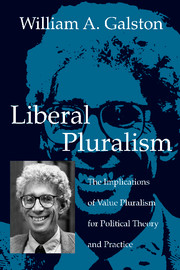Book contents
- Frontmatter
- Contents
- Acknowledgments
- LIBERAL PLURALISM
- I INTRODUCTION
- II FROM VALUE PLURALISM TO LIBERAL PLURALIST THEORY
- 2 Two Concepts of Liberalism
- 3 Three Sources of Liberal Pluralism
- 4 Liberal Pluralist Theory: Comprehensive, Not Political
- 5 From Value Pluralism to Liberal Pluralist Politics
- 6 Value Pluralism and Political Community
- III THE PRACTICE OF LIBERAL PLURALISM
- Index
5 - From Value Pluralism to Liberal Pluralist Politics
Published online by Cambridge University Press: 20 March 2010
- Frontmatter
- Contents
- Acknowledgments
- LIBERAL PLURALISM
- I INTRODUCTION
- II FROM VALUE PLURALISM TO LIBERAL PLURALIST THEORY
- 2 Two Concepts of Liberalism
- 3 Three Sources of Liberal Pluralism
- 4 Liberal Pluralist Theory: Comprehensive, Not Political
- 5 From Value Pluralism to Liberal Pluralist Politics
- 6 Value Pluralism and Political Community
- III THE PRACTICE OF LIBERAL PLURALISM
- Index
Summary
I have argued that there are good reasons to accept value pluralism as the best account of the moral universe we inhabit, and no good reason to reject comprehensive theory as a part of our motivation for embracing a political theory. This leaves open the question of what the implications of value pluralism for political theory may be. I begin my answer to this question by exploring the disagreement between John Gray and the late Isaiah Berlin.
THE POLITICAL IMPLICATIONS OF VALUE PLURALISM: JOHN GRAY VERSUS ISAIAH BERLIN
Isaiah Berlin is famous for an account of liberalism resting on two master-ideas: value pluralism and negative liberty, understood as the capacity of individuals, unimpeded by external coercion or constraint, to choose for themselves among competing conceptions of good or valuable lives. In a series of recent writings, John Gray argues that these two master-ideas do not fit together. The more seriously we take value pluralism, the less inclined we will be to give pride of place to negative liberty as a good that trumps all others. We will certainly not be able to accord negative liberty anything like lexical priority. We will accept that lives defined by habit, tradition, or the acceptance of authority can be valid forms of human flourishing, and that forms of political association organized to defend groups practicing these ways of life are themselves legitimate.
- Type
- Chapter
- Information
- Liberal PluralismThe Implications of Value Pluralism for Political Theory and Practice, pp. 48 - 64Publisher: Cambridge University PressPrint publication year: 2002



